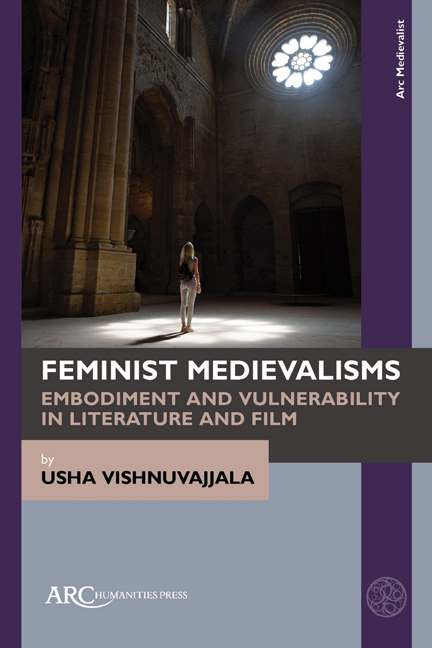Book contents
- Frontmatter
- Contents
- Acknowledgements
- Introduction
- Chapter 1 Nested Medievalisms and Affected Bodies in Jane Austen’s Northanger Abbey
- Chapter 2 Feminism and Medievalism in Woolf’s Final Works
- Chapter 3 Medievalism as Feminist Sanctuary in the late Twentieth Century
- Chapter 4 Chaucer, Vulnerable Bodies, Somatophobia, and Theory
- Conclusion: Feminisms and Medievalisms
- Select Bibliography
- Index
Chapter 3 - Medievalism as Feminist Sanctuary in the late Twentieth Century
Published online by Cambridge University Press: 28 March 2024
- Frontmatter
- Contents
- Acknowledgements
- Introduction
- Chapter 1 Nested Medievalisms and Affected Bodies in Jane Austen’s Northanger Abbey
- Chapter 2 Feminism and Medievalism in Woolf’s Final Works
- Chapter 3 Medievalism as Feminist Sanctuary in the late Twentieth Century
- Chapter 4 Chaucer, Vulnerable Bodies, Somatophobia, and Theory
- Conclusion: Feminisms and Medievalisms
- Select Bibliography
- Index
Summary
FROM WOOLF’S Second World War-era representation of an embodied feminist history alongside more conventional narratives of institutional and national history, I turn to a very different representation of embodying history: that of women seeking sanctuary from violence in houses of religion after witnessing murders and practicing forms of affect, affinity, and compassion that draw on late medieval ideas. This chapter will argue for reading a particular type of feminist embodied medievalism in American audio-visual texts that might be read as casually medievalist for their representations of Catholicism in the United States. I go further here, examining them in their dual contexts as artifacts of the period between 1989 and 1993 (the years of the George H. W. Bush administration and, as we will see in this chapter and the next, a watershed period for discourses about women’s bodies, violence against women, and feminist thought in the United States) and as engagements with late medieval forms of women’s religious and affective practice, religious communities, and legal culture. This chapter considers Mary Lambert’s 1989 music video for Madonna’s song “Like A Prayer” and Emile Ardolino’s 1992 film Sister Act, and argues for adding them to the “canon” of 1980s/90s medievalism alongside works like Marion Zimmer Bradley’s Mists of Avalon, Donald Barthelme’s The King, John Boorman’s Excalibur, and Stephen Weeks’s Sword of the Valiant, even though, unlike those texts, neither of these is set in the Middle Ages. Considering them as works of medievalism allows us to expand our definitions of medievalism to those representing women’s practices and affective links across time in modes that draw on medieval forms of affect, community, and sanctuary, but it also requires us to engage substantively with the complex ways these texts are representing medievalism, rather than relying on the Anglo-centric association of Catholicism—a religion practiced by over a billion people today—with the Middle Ages. Furthermore, these two cinematic texts demonstrate that engagements with medievalism can be an important vehicle for expanding the possibilities for women’s communities and feminist affective identifications to comment on contemporary issues surrounding racism, and for modelling feminist sympathies that embrace racial difference while also acknowledging the unequal treatment of different groups of Americans.
- Type
- Chapter
- Information
- Feminist MedievalismsEmbodiment and Vulnerability in Literature and Film, pp. 67 - 94Publisher: Amsterdam University PressPrint publication year: 2024



